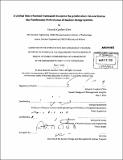A unified risk-Informed framework to assess the proliferation risk and license the proliferation performance of nuclear energy systems
Author(s)
Cavalieri d'Oro, Edoardo
DownloadFull printable version (35.56Mb)
Alternative title
risk-Informed framework to assess the proliferation performance of nuclear energy systems
Other Contributors
System Design and Management Program.
Advisor
George Apostolakis.
Terms of use
Metadata
Show full item recordAbstract
In order to strengthen the current non-proliferation regime it is necessary to guarantee high standards of security for the sites that use, store, produce, or reprocess special nuclear materials (SNM). The current surge of interest in nuclear energy requires resolution of concerns about the appropriateness of the current nuclear non-proliferation regulatory framework for the threats challenging nuclear energy systems (NES). This is especially true also considering that the structure of the current industry is exposed to imminent significant changes such as the introduction of small modular reactors (SMR), and the adoption of nuclear power in countries with unstable political systems. Over recent decades, countries nominally adhering to the Non-Proliferation Treaty (NPT) violated it by building concealed facilities, by manipulating the configuration of their power plants, and by diverting material from their nuclear energy research and production sites. These events show evidence of a major paradigm shift in the area of non-proliferation, which started with the rivalry between two major opponents (each being guardian of its arsenal and technologies during the cold-war), and later reconfigured itself into the confrontation between countries hosting nuclear technologies, or networks of opponents, trying to acquire materials, knowledge and skills necessary to build a nuclear weapon. To create an appropriate response to all the above issues, and thus to strengthen back the nonproliferation regime, while confronting the shifted paradigm of nuclear proliferation, new tools and methods for evaluating the proliferation risk associated with nuclear energy systems become necessary. In this thesis, I discuss some of the fundamental traits and assumptions of the framework I developed in order to assess the proliferation risks associated with NESs. Important decisions within the proliferation domain, can be evaluated by a systematic and holistic approach. The high-level objective of the framework proposed here is to create a license process for the proliferation performance of NESs, and to provide a platform to assist the evaluations of the different alternatives than can be taken in order to strengthen the current non-proliferation regime.
Description
Thesis (S.M. in System Design and Management)--Massachusetts Institute of Technology, Engineering Systems Division, System Design and Management Program, 2011. Cataloged from PDF version of thesis. Includes bibliographical references.
Date issued
2011Department
System Design and Management Program.; Massachusetts Institute of Technology. Engineering Systems DivisionPublisher
Massachusetts Institute of Technology
Keywords
Engineering Systems Division., System Design and Management Program.